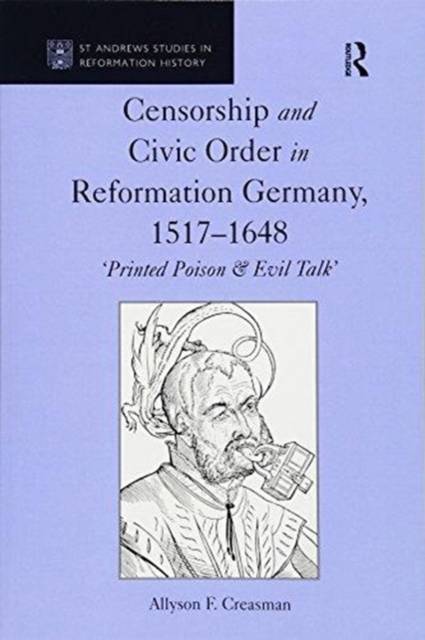
Bedankt voor het vertrouwen het afgelopen jaar! Om jou te bedanken bieden we GRATIS verzending (in België) aan op alles gedurende de hele maand januari.
- Afhalen na 1 uur in een winkel met voorraad
- Gratis thuislevering in België vanaf € 30
- Ruim aanbod met 7 miljoen producten
Bedankt voor het vertrouwen het afgelopen jaar! Om jou te bedanken bieden we GRATIS verzending (in België) aan op alles gedurende de hele maand januari.
- Afhalen na 1 uur in een winkel met voorraad
- Gratis thuislevering in België vanaf € 30
- Ruim aanbod met 7 miljoen producten
Zoeken
Censorship and Civic Order in Reformation Germany, 1517-1648
'Printed Poison & Evil Talk'
Allyson F Creasman
Paperback | Engels
€ 106,95
+ 213 punten
Uitvoering
Omschrijving
The history of the European Reformation is intimately bound-up with the development of printing. With the ability of the printed word to distribute new ideas, theologies and philosophies widely and cheaply, early-modern society was quick to recognise the importance of being able to control what was published. Whilst much has been written on censorship within Catholic lands, much less scholarship is available on how Protestant territories sought to control the flow of information. In this ground-breaking study, Allyson F. Creasman reassesses the Reformation's spread by examining how censorship impacted upon public support for reform in the German cities. Drawing upon criminal court records, trial manuscripts and contemporary journals - mainly from the city of Augsburg - the study exposes the networks of rumour, gossip, cheap print and popular songs that spread the Reformation message and shows how ordinary Germans adapted these messages to their own purposes. In analysing how print and oral culture intersected to fuel popular protest and frustrate official control, the book highlights the limits of both the reformers's influence and the magistrates's authority. The study concludes that German cities were forced to adapt their censorship policies to the political and social pressures within their communities - in effect meaning that censorship was as much a product of public opinion as it was a force acting upon it. As such this study furthers debates, not only on the spread and control of information within early modern society, but also with regards to where exactly within that society the impetus for reform was most strong.
Specificaties
Betrokkenen
- Auteur(s):
- Uitgeverij:
Inhoud
- Aantal bladzijden:
- 304
- Taal:
- Engels
Eigenschappen
- Productcode (EAN):
- 9781138109018
- Verschijningsdatum:
- 25/05/2017
- Uitvoering:
- Paperback
- Formaat:
- Trade paperback (VS)
- Afmetingen:
- 156 mm x 234 mm
- Gewicht:
- 430 g

Alleen bij Standaard Boekhandel
+ 213 punten op je klantenkaart van Standaard Boekhandel
Beoordelingen
We publiceren alleen reviews die voldoen aan de voorwaarden voor reviews. Bekijk onze voorwaarden voor reviews.









